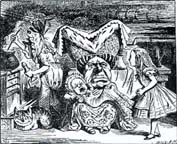 The Duchess is the first matronly — or we should say, un-matronly — character whom Alice encounters in Wonderland. Chancing upon a small house in the woods, Alice enters the house and finds the Duchess "sitting on a three-legged stool in the middle, nursing a baby." We behold, at first, the plain image of an ugly Duchess mothering her infant. Nothing appears out of the ordinary. However, the prospects of an ideal mother-figure vanish when the Duchess bluntly informs Alice,
The Duchess is the first matronly — or we should say, un-matronly — character whom Alice encounters in Wonderland. Chancing upon a small house in the woods, Alice enters the house and finds the Duchess "sitting on a three-legged stool in the middle, nursing a baby." We behold, at first, the plain image of an ugly Duchess mothering her infant. Nothing appears out of the ordinary. However, the prospects of an ideal mother-figure vanish when the Duchess bluntly informs Alice,
'You don't know much,' said the Duchess; 'and that's a fact.'
Alice did not at all like the tone of this remark, and thought it would be as well to introduce some other subject of conversation. While she was trying to fix on one, the cook took the cauldron of soup off the fire, and at once set to work throwing everything within her reach at the Duchess and the baby — the fire-irons came first; then followed a shower of saucepans, plates, and dishes. The Duchess took no notice of them even when they hit her; and the baby was howling so much already, that it was quite impossible to say whether the blows hurt it or not.
We quickly realize that the Duchess makes, in fact, a horrifying and unsympathetic parent. While giving the baby "a violent shake," the Duchess sings about beating him so that he will learn to enjoy eating pepper. Strangely enough, when Alice meets the Duchess again at the royal croquet-grounds, she finds the Duchess in "a pleasant temper" — but first impressions are always misleading in Alice's fantasy world. The Duchess soon wears out her welcome by squeezing fatuous morals out of Alice's every remark.
Alice encounters several other stately matrons along her imaginary travels, but none of them turn out to be a suitable mother figure. The Duchess, the Queen of Hearts, the Red Queen, and the White Queen all make very poor caretakers of either their own offspring or of Alice. When they are not treating Alice with varying levels of contempt or condescension, they coddle her to the point of vexation. These would-be mother figures express every personality flaw that a curious child such as Alice would find unbearable.
Questions
1. Although we find the explosive Queen of Hearts obviously disagreeable, do the Red Queen and the White Queen fare any better as mother figures? Why or why not? What is Dodgson's purpose in excluding suitable mother figures from Alice's imaginary travels, and why does he choose to leave the competent female caretakers, such as Alice's older sister, in the real world?
2. What is the significance, if any, of the Duchess's baby turning into a pig? Does this transformation hold any symbolic meaning, or does it merely add to the dream-like unpredictability of Alice's fantasy world? Does Dodgson want us to search for philosophical meaning in the absurdity of Wonderland, or should we take everything at face value?
3. In both Great Expectations and Jane Eyre, the protagonists also suffer injustices inflicted by overbearing women. Compare and contrast how Alice, Pip, and Jane handle the female despots in their lives. How do their verbal responses and coping strategies reflect the social class in which they were brought up?
4. In A Man's Place: Masculinity and the Middle-Class Home in Victorian England, John Tosh argues that fathers became increasingly marginalized in the upbringing of middle-class children during the Victorian age.
From being little more than an intermediary between her husband and his children, the mother was recognized by the 1830s to be the moral force of family life, with her own spirituality and her own genius for the management of children . . . Child-rearing advice literature in the eighteenth century had commonly been addressed to the father, on the assumption that he exercised the chief responsibility for his children's upbringing once the nursing stage was over; now it tended to be written for mothers alone, or for parents in such a way as to exclude fathers. [pp. 90-91]
Interestingly, in the Alice books, we find that many of the male figures treat Alice in a much more benevolent manner. When the Queen of Hearts gives orders for the immediate removal of Alice's head, the King of Hearts "laid his hand upon [Alice's] arm, and timidly said 'Consider, my dear: she is only a child!'" The gravity-prone Knight in Through the Looking Glass guides Alice through the woods while giving her all sorts of arbitrary, but well-intentioned advice. Why does Dodgson choose to emphasize the kindly father figures instead of the kindly mother figures? What does Dodgson suggest about children's attitudes toward their parents during the Victorian era?
References
Tosh, John. A Man's Place: Masculinity and the Middle-Class Home in Victorian England. 1999. New Haven: Yale University Press, 2007.
Last modified 12 March 2009